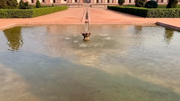
The mixture of "ponds" and "kilograms" does little but create confusion, rooted in both historic European weight measures and the keeping of a pond in one's yard. You probably have come across the phrase recently "how many ponds kido grams," it is a misspelling in which two words "kilograms" and "ponds." In this paper, we look at these subtleties; explain how to convert "ponds"-the old unit of measurement related to pounds-and kilogram and illustrate their practical and everyday applications. We will further give practical advice on caring for and treating the real pond utilizing weight-to-volume ratios. Finally, we will explore how the POPOSOAP range of products can improve both the health and appearance of your pond. By the end of this article, you will know all about ponds as a unit of measurement and as a feature in your tranquil garden oasis.
Understanding Ponds and Kilograms
The term “pond” has two main contexts. Originally, the word "pond" was used in many European languages, such as Dutch or German, as a unit of weight and equaled about one pound, commonly abbreviated as lb. Nowadays, the imperial pound, 1 lb, has become the standard in the US and the UK. You may still find "ponds" in older recipes or regional references. That is why such questions are possible: "How many ponds kido grams? " or "How many ponds in a kilogram?
and " often pop up. All they're really asking for is the same conversion that's used with pounds to kilograms.
Meanwhile, the kilogram or kg is a metric base unit of mass and one of the most widely used units globally in scientific, commercial, and everyday applications. Knowing the conversion between ponds-or pounds-and kilograms becomes important in today's interconnected world-particularly if you find yourself reading international recipes, traveling abroad, or maintaining a backyard pond that requires precise treatments.
What Is the Conversion Rate?
The generally accepted conversion between kilograms and pounds, and by extension ponds, is as follows:
1 kg ≈ 2.20462 pounds (ponds)
For ease of use, most people round this figure to 2.2.
So if you’re grappling with “How many ponds kido grams?”—whether from a typo or a genuine query—you can rely on:
• 1 kg ≈ 2.2 ponds
• 0.5 kg ≈ 1.1 ponds
• 2 kg ≈ 4.4 ponds
This simple relationship makes life easier-be it weighing baking ingredients or measuring pond treatments-by facilitating conversions between metric and imperial systems.
Where this conversion is useful in ponds and kilograms.
1. Culinary Uses: You may encounter recipes from the US that list ingredients in pounds while your kitchen scale is measured in kilograms or vice versa. Understanding the 2.2 rule ensures that you can accurately follow recipes.
2. Travel and Luggage: Most airlines are rethinking their baggage limits over kilograms, but some regions still apply pounds. Quick conversions will save you from overweight charges or problems on the check-in counter.
3. Fitness and Health: Most of the weights on equipment at the gym or provided by personal trainers are in pounds, while most medical charts are in kilograms. Converting between them will definitely provide consistency in progress over time.
4. Trade and Commerce: International markets and online retailers may quote using pounds and sometimes kilograms. This, therefore, makes it easy, by conversion of "ponds" into kilograms, to compare prices or weights correctly.
5. Pond Treatments: If you have a real pond, dosing instructions may be given in pounds, and your measuring devices could be marked in kilograms. A simple conversion will keep the ecosystem of your pond in balance.
Practical Tips for Pond Management Using Weight and Volume
If you’re caring for a garden pond, precise weight-to-volume calculations can be crucial for maintaining water quality and healthy aquatic life. Many pond additives, like beneficial bacteria or algaecides, specify dosages based on weight in pounds (or ponds) per a certain volume of water:
· Calculate Your Pond's Volume: Measure length, width, and average depth. In feet, you might do length x width x depth x 7.48 = gallons. In meters, length x width x depth = cubic meters, and each cubic meter = 1,000 liters.
· Match Dosage Instructions: If the product label gives pounds per 1,000 gallons, and it is easier to convert into kilograms per liter. Remember 1 pound ≈ 0.45 kg, 1 gallon ≈ 3.78 liters.
· Be Consistent: Select one system- imperial or metric- and stay with that system throughout your calculation to eliminate mistakes or doubling of conversions.
Enhancing Your Pond with POPOSOAP Products
Maintaining a balanced pond goes beyond knowing how to convert "ponds" into "kilograms." The following are some of the POPOSOAP products that will maintain your pond clean, clear, and healthy:
· Eco-Friendly Ingredients: POPOSOAP is all about natural formulations that do not harm fish or plants for a sustainable and vibrant pond environment.
· Clear, Straightforward Application: Products offer easy instructions—both metric and imperial—giving one indication of exactly how much is put in a water body in which one needs them, be that in kilograms or pounds (ponds).
· Customer Assistance: Sometimes unsure whether one actually needs 1 pound or 0.45 kilograms of an applied treatment; POPOSOAP provides additional tools and/or resources, coupled with customer assistance support.
How to Master the Kilograms/Ponds Conversion
Now, it will be great to explore "how many ponds kido grams", or otherwise said, "How many ponds are in one kilogram?". The major point for the conversion is that 1 kilogram ≈ 2.2 ponds. The knowledge is vital in different areas of activity: cooking, travel, shopping, fitness, and even taking care of a real pond in the yard. With basic means of conversion, some mental calculation shortcuts, and several new and innovative pond care products from POPOSOAP, dealing with both metric and imperial will become a breeze. Allow these new skills to elevate the perfection of your bread baking or suitcases, being efficiently packed with items across many different pond situations with crystal-clear water containing healthy fish and plants.







